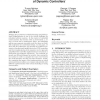Free Online Productivity Tools
i2Speak
i2Symbol
i2OCR
iTex2Img
iWeb2Print
iWeb2Shot
i2Type
iPdf2Split
iPdf2Merge
i2Bopomofo
i2Arabic
i2Style
i2Image
i2PDF
iLatex2Rtf
Sci2ools
117
click to vote
EMSOFT
2006
Springer
2006
Springer
Time-triggered implementations of dynamic controllers
Bridging the gap between model-based design and platformbased implementation is one of the critical challenges for embedded software systems. In the context of embedded control systems that interact with an environment, a variety of errors due to quantization, delays, and scheduling policies may generate executable code that does not faithfully implement the model-based design. In this paper, we show that the performance gap between the model-level semantics of proportional-integral-derivative (PID) controllers and their implementation-level semantics can be rigorously quantified if the controller implementation is executed on a predictable time-triggered architecture. Our technical approach uses lifting techniques for periodic, time-varying linear systems in order to compute the exact error between the model semantics and the execution semantics. Explicitly computing the impact of the implementation on overall system performance allows us to compare and partially order different impl...
Computer Systems Organization | Embedded Software Systems | EMSOFT 2006 | Model-based Design | Software Engineering |
Related Content
| Added | 22 Aug 2010 |
| Updated | 22 Aug 2010 |
| Type | Conference |
| Year | 2006 |
| Where | EMSOFT |
| Authors | Truong Nghiem, George J. Pappas, Rajeev Alur, Antoine Girard |
Comments (0)

